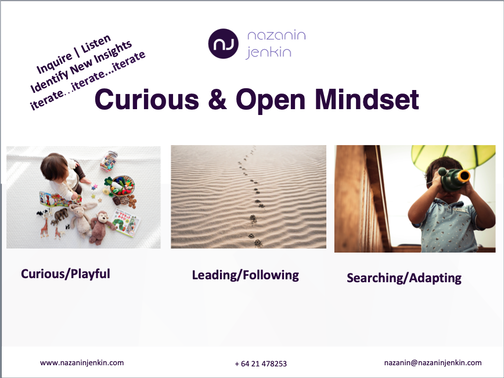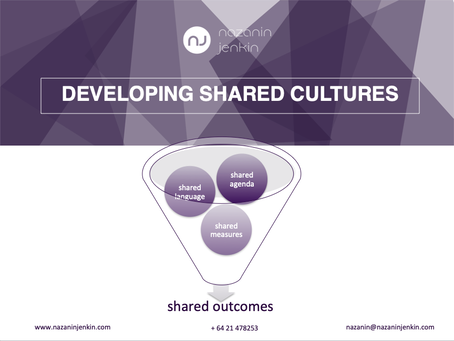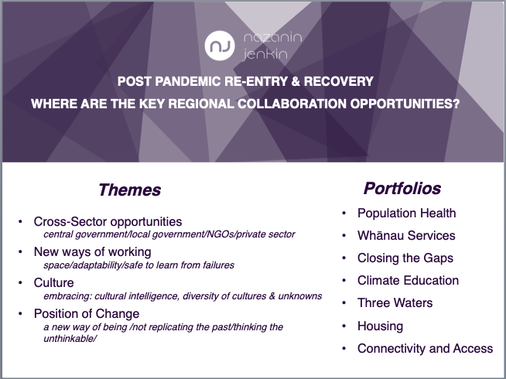I'm thinking about... |
|
Over the last four weeks, we have offered some of our collaboration insights for regions and local communities in Aotearoa New Zealand. In the first three articles in this series, we built the case for ‘why’ collaboration is critical for regional impact; ‘how’ collaboration has led to success in a New Zealand regional context (with two case studies); then we expanded on the “Art of Collaboration”, with six key themes to support leaders in Aotearoa. In this, our final post, we explore the “Benefits of Collaboration”, with an ongoing focus on Regional Impact. The value of collaboration – regional, team, cross-organisation, cross-sector, across the supply chain or other - is built on the premise that we are #betterworkingtogether. And, that to #buildbackbetter in a post-COVID environment, responding to the wicked and complex problems facing us nationally and globally requires “everyone and everything” – the variety of resources, people, disciplines and skills. When we ask people to share of their most positive collaboration experiences, we find their responses are often deeply personal and rooted in high-trust relationships. Participants in our workshops said: - Collaboration leads to connection with people. You feel like you’re on a mission together. However, because collaboration is not a linear process, nor a direct cause and effect relationship - evidencing the benefits has proven to be challenging. Whilst there is a growing interest in collaboration as an approach and methodology, there is still an accompanied rhetoric that collaboration can be “problematic, very difficult or hard”. So we find leaders continue to ask:
We know that an ongoing focus on quantitative analysis with siloed KPIs and outcomes has limitations in this arena. The benefits of collaboration are more evident when we take a “shared measures” approach. Additionally, we have to consider how we can turn positive experiences and oft “intangibles” into “tangibles” by using potential “proxy” measures that better reflect the benefits of the collaboration journey. Most importantly, we need to consider wider social and community benefits through alternative evaluation and assessment approaches such as qualitative analysis and stories. We can identify changes in behaviour and circumstances better, when told by the beneficiaries of the specific collaborative initiative. Talking a business perspective, the Institute for Collaborative Working (ICW) in partnership with Warwick University research “Benefits Realisation from Collaborative Working” found tangible benefits of collaboration included:
- The value of collaboration is mutual benefit. - The value has been in being able to have a different level, more strategic conversations with our customers, but also the fact that it’s created a framework for our teams and our more junior staff members to work to. So there’s a common way of working across the business now. So that’s a value that’s directly attributable to collaborative working. Taking a team collaboration perspective Deloitte’s “The Collaborative Economy” report showed benefits included: · Improved Time-saving and Productivity of Employees · Improved Quality of Work Output · Improved Innovation and New Ideas Generation · Improved Employee Engagement and Reduced Turnover · Increased Growth · Increased Profitability The report showed that, “Companies that prioritise collaboration are also five times more likely to experience a considerable increase in employment, twice as likely to be profitable, and twice as likely to outgrow competitors.” and “...businesses that consider collaboration an important component of their overall business strategy were four times more likely to see growth in their bottom line.” In our work and research we have shown that taking a collaborative approach, within a structured framework (you can’t “wing it” or just work with intuition!) delivers three key benefits: 1. Improved Innovation Bringing together the variety of voices of all those that have “skin in the game” - diverse personalities, disciplines and expertise - improves momentum and supports problem solving. Safe, open spaces encourage open communication and help create a dialogue that finds solutions faster and enables untapped opportunities come to life. Sometimes, bringing together different perspectives creates friction, but this friction often sparks new, dynamic ideas. Working in an environment of mutual respect, we embrace “healthy conflict” and support the emergence of new ideas. In our experience, whatever the outcome, when all the voices have been heard – everyone is more comfortable and able to embrace the final decision and approach. With reduced duplication, streamlined shared processes and back office system support and shared transparent shared risks, it is easy to see how everything comes together to increase profitability for individual organisations and the whole region. Together, partners are able to support regional community wellbeing across the spectrum: social, economic, cultural and environmental. Working collaboratively to drive innovation together supports timely and ongoing communication; encourages a collective line-of-sight on the opportunities; helps us adapt to change; and, holds the collaboration space across all contributors and partners, irrespective of external pressures. 2. Improved Cultures: leading to Improved Performance and Wellbeing The ICW report challenged us “to change traditional organisational cultures to more readily accept collaborative business models”. They said, “This highlights the need to identify and further develop competencies and skills to harness collaborative working. There is a clear recognition that the adoption of a more systematic approach...integrated with supportive collaborative processes and systems will underpin the business environment where collaborative working can be seen as a competitive advantage.” In our experience, whatever the outcome, when all the voices have been heard – everyone is more comfortable and able to embrace the final decision and approach. With reduced duplication, streamlined shared processes and back office system support and shared transparent shared risks, it is easy to see how everything comes together to increase profitability for individual organisations and the whole region. Everyone has been part of a team or complex programme of work where everything breaks down due to poor or untimely communication. Understanding the impact of our efforts in light of the whole, coupled with the communication skills and wider collaboration behaviourial set, we are able to integrate efforts and changes into the programme to ensure the right outcomes. Collaboration tends to make people feel more connected to each other and therefore more motivated to work together towards a common goal. It fosters a sense of collective purpose, with a meaningful reason to work together and achieve better results as part of a “team”. Agreeing collaboration as a regional strategy creates a values-based culture, driven by “collaboration” and “collaborative behaviours” as the accepted norm. 3. Collective Impact This in turn drives an ecosystem approach across individual contributors and portfolio leads. It becomes possible to see the connections across the system more transparently. Complex governance mechanisms, disconnected regional strategies, undergirded by red-tape bureaucracies are unhelpful; so we need to foster high-trust relationships that dominate the culture of working together in our communities and regions.It’s only when we take an “ecosystem” approach that real change is possible and we are able to focus on optimising the collective impact of individual efforts, across the regional disciplines and portfolios (e.g. housing, infrastructure, three waters, community connectedness, social sector initiatives etc.) to deliver shared value and collective impact The opportunities for #workingbettertogether in New Zealand are endless, and to truly #buildbackbetter, we need each other to build “our” collaborative muscle. All this requires courageous leaders that embrace collaboration - not just as a competitive advantage, but rather an existential advantage for their business, region and community in these disruptive times.
If you are on a strategic collaboration and partnership journey – do get in touch, let’s talk. We’d welcome the opportunity to serve you in your context. No silver bullets, just proven and tested frameworks and approaches. Until next time, kei runga noa atu. He waka eke noa
0 Comments
Leave a Reply. |
Nazanin jenkinNazanin Jenkin Archives
September 2021
Categories
All
|




